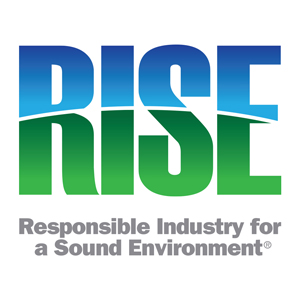
LOGO: RISE
Advocacy mobilization has been the focus for Responsibility for a Sound Environment (RISE) in 2021. As I write this, we are five months into our new five-year strategic plan, and nearly as many months into the Biden administration, so we have many opportunities to tell our industry’s story.
Two important new initiatives, both launched in March, are helping us amplify our voice in conversations about pesticides with newly appointed and elected federal and state lawmakers and regulators:
1. We launched the RISE Grassroots Network, which we hope will become part of a larger industry action network. The goal of this initiative is to prepare, resource and quickly mobilize on issues to amplify our advocacy. We see it as complementing other industry grassroots programs, especially those of national and state partners. We’ll also be working with people who need to connect with other industry stakeholders and resources. Our new grassroots manager, Megan Striegel, will be growing this network and taking best practices from our national partners, including the National Pest Management Association.
2. We are now able to share powerful new opinion research results, showing people’s overwhelming support for the federal and state pesticide regulatory framework. One of the most important aspects of successful advocacy is having messaging that is relatable and effective. We found in focus groups and in a national survey that there is a shift to a more pragmatic, science-based approach to pesticides among voters. People are more aware of the need to have access to safe and effective products. The COVID-19 pandemic appears to be a contributor, with people increasingly guided by science-based approaches that rely on expert findings and data. Our research found that 80 percent of people agree pesticide products are necessary to “protect my home, health, and community from invasive weeds and pests.”
On the surface, virtually no participants in our research believe changing the current regulatory framework and removing state or federal preemption and regulation is good public policy. Most people can clearly identify the consequences of enacting laws repealing or changing the current framework, and question how such laws could be enforced. Eighty-three percent of research respondents think the extensive scientific review and regulatory process for pesticides at the federal and state levels ensures pesticide products can safely and effectively protect public health, safety and property. More tellingly, they do not think the current scientific review and regulatory process for pesticides at the federal and state levels is broken and needs to be fixed.
Further, the U.S. Environmental Protection Agency (EPA) and federal government are largely viewed as trustworthy, with the expertise and resources to effectively regulate pesticide products. The EPA and other federal agencies are particularly credible, given that most people believe they are non-partisan organizations.
By sharing a few facts about the regulatory framework, and by mentioning familiar professional treatments for rodents and termites, we can build understanding with most voters and policy professionals. Connecting everyone in our industry with this messaging is a primary goal for 2021. At press time, we have active state bills seeking to repeal state pesticide preemption laws, and we have a federal bill that would seek to change our pesticide regulatory framework, including granting express authority for localities to regulate pesticides. (Editor’s Note: For more on this topic, please see our March 2021 cover story here: 5 regulatory issues to watch in 2021.)
Along with our day-to-day advocacy work, we all have a great opportunity to talk about pesticide regulation in a factual way that really resonates with people. We are working to make those connections and share the research insights.

Megan Provost
Pesticide regulation talking points
When talking about pesticide regulation policy to your local lawmakers, or even to customers who want to learn more about how pesticides are regulated, consider the following. You also can use and refer to the RISE website, PestFacts.org.
- The U.S. Environmental Protection Agency (EPA) has responsibility for federal regulation of all pesticides claiming efficacy for a specific pest. All such products for sale in the United States must have an EPA registration.
- The EPA evaluates scientific data, intended use, and effectiveness of a pesticide product to determine both the risks and the benefits of the product.
PROVOST is president of Responsible Industry for a Sound Environment (RISE). She may be reached at 202-872-3860 or RISE@pestfacts.org.
The post RISE continues outreach efforts to educate public appeared first on Pest Management Professional.
source https://www.mypmp.net/2021/05/26/rise-continues-outreach-efforts-to-educate-public/
No comments:
Post a Comment